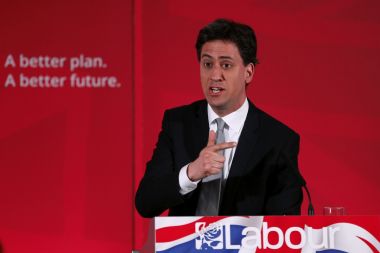Milibrand: Give us some credit, young people don't need Russell Brand to get us excited about politics

The media circus following Ed Miliband's interview with Russell Brand was inevitable, as was #Milibrand that began trending soon afterwards. Ever since #Milibae and #Milifandom inexplicably became things, it's going to take a fair bit more than that before we're surprised at what the internet is capable of.
What's frustrating, is how little credit anyone is giving the young voters they accuse Miliband of so desperately trying to court. I speak as one of them; I'm 23, and will be voting next week for only the second time. I'm slap bang in the middle of this demographic.
Last night, the Guardian ran a piece asking whether the interview "worked". Did it attract young people or harm Miliband's credibility? the newspaper asked. Will it sway how Generation Y might vote? Critics, ie anyone who works for Rupert Murdoch (The Times posted an article bashing the interview just 18 minutes after the 16-minute-video was posted, and The Sun was accused of writing its review hours in advance), slammed the Labour leader for adopting a different accent; dropping his 't's and using words like "ain't". Middle-class middle-aged Miliband was derided for trying to adopt 'youth speak' in an embarrassing attempt to appeal to a younger audience.
Here's the thing, though. Most young people don't need Russell Brand to convince us that politics is important. We just don't. I belong to a generation who, if anything, I think are more convinced of the power of policy than many that have gone before us. Loads of us voted Lib Dem in the last election, caught up in the wave of student-fee pledges and the hope of a brighter (yellow) future, and were devastated when Clegg failed to uphold his promises. There will be similar stories from those who backed other parties, and our view of politicians has no doubt suffered. We're not under any illusions that they're perfect – but then, were we ever?
Brand has built his image as a voice for young people; he says we don't vote because we can't see the point. We think the "unelected, powerful elites" are pulling all the strings and the best course of action is to throw our hands in the air and have no part in it. This isn't apathy, he insists, but the only reasonable response to a broken system that favours the wealthy. Brand's line of thinking would have us believe that not voting is a form of activism.
Except that's not my experience, and his theory about my peers is not one that I can buy into. A friend recently confessed that she'd forgotten to register to vote on May 7, but was afraid to tell anyone because she was so embarrassed. My generation work for foodbanks and volunteer in prisons, we canvass, read manifestos cover-to-cover, and struggle to get through dinner without mentioning the election. We do care, actually. And the same can be said for those younger than us; that 'all teenagers are apathetic' rhetoric is tired, patronising and usually only employed by people who haven't bothered to ask any actual teenagers what they think.
If anything, the failure of politicians to keep their promises has ensured we're more engaged, and more careful about who we vote for. Parliament has the power to make changes that affect us and our communities, and we want a say in it. We don't care whether Miliband, Clegg, Cameron et al hang out with 'cool' celebs or know who Russell Brand is.
Sure, there might be a few who are more likely to listen to the end of a politician's speech if Brand is interjecting every ten seconds (according to Buzzfeed's calculations, over half the interview was Brand talking), but we don't need warning that we could be being tricked into voting by celeb endorsement. Let us make up our own minds.
Give us more credit than thinking we'll be swayed by an interview in a swish kitchen with a candle burning in the background, and let what Miliband actually said speak for itself. We're interested in his policies, not his accent.











